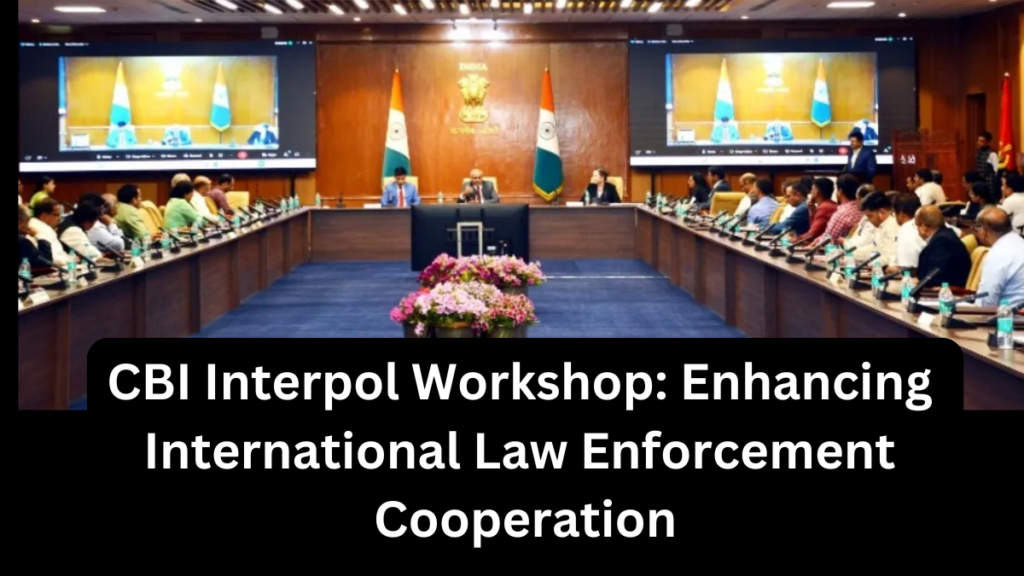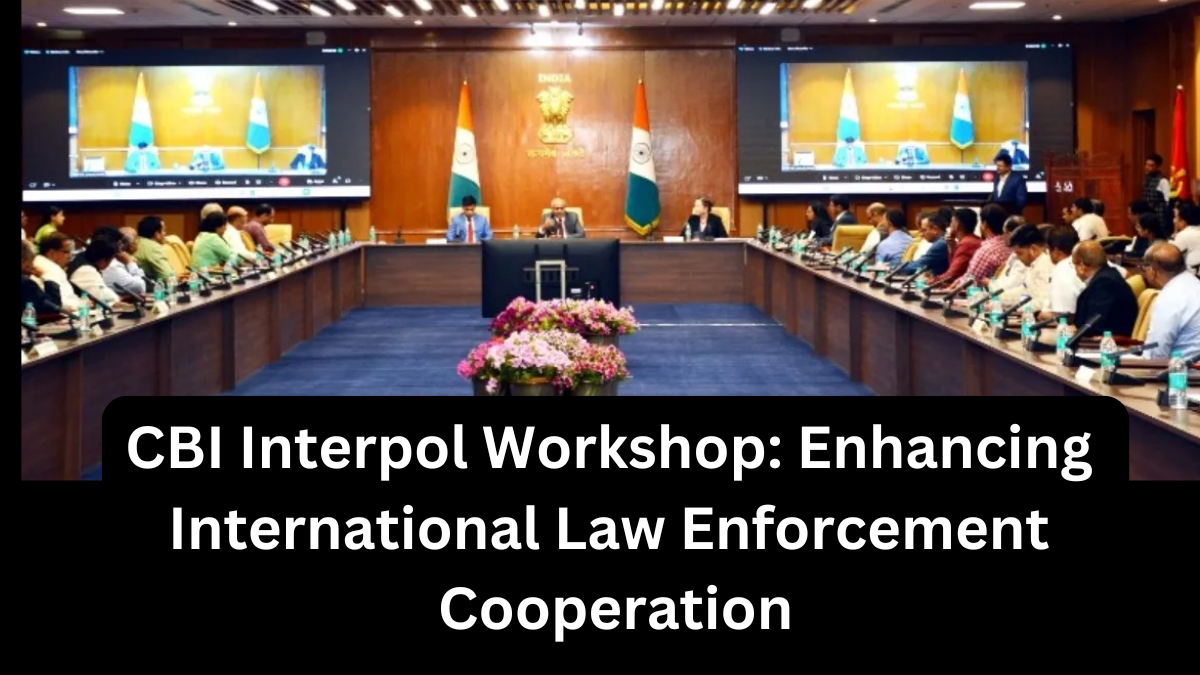The Central Bureau of Investigation (CBI) recently organized a two-day workshop on March 24 and 25 to enhance the understanding of Interpol’s colour-coded notices among Indian law enforcement agencies. The event focused on addressing the legal aspects of Interpol notices, their review mechanisms, and how Indian agencies can utilize them for international cooperation.
The workshop was conducted in collaboration with the Notice and Diffusion Task Force of Interpol, bringing together key stakeholders from central investigative bodies, state police forces, and legal experts to discuss strategies for streamlining international assistance requests.

Objectives of the Workshop
The primary aim of the workshop was to help Indian law enforcement agencies better understand the Interpol colour-coded notice system and its legal framework. Additionally, it focused on:
-
Legal Review of Notices: Officers were trained to assess Interpol notices within the context of international legal mandates and compliance mechanisms.
-
International Collaboration: The discussions emphasized how Indian agencies can seek assistance from foreign law enforcement bodies through Interpol’s framework.
-
Handling Foreign Requests: Officials were guided on how to execute requests from international agencies effectively.
-
Utilization of Bharatpol Portal: Agencies were encouraged to use Bharatpol, a dedicated platform for Indian law enforcement to submit requests for international police cooperation.
Participating Agencies
The workshop witnessed participation from various Indian law enforcement bodies, judicial experts, and government representatives, including:
Central Agencies:
-
Central Bureau of Investigation
-
Enforcement Directorate
- National Investigation Agency
- Narcotics Control Bureau
-
Directorate of Revenue Intelligence
-
Delhi Police
-
Wildlife Crime Control Bureau
Other Stakeholders:
-
State and Union Territory Police Departments
-
Ministry of External Affairs Representatives
-
Union Home Ministry Officials
-
Judges and Legal Experts
This diverse participation ensured a comprehensive discussion on the legal, procedural, and operational aspects of Interpol’s international policing framework.
Understanding Interpol’s Colour-Coded Notices
A major focus of the workshop was on the nine colour-coded notices issued by Interpol. These notices serve as alerts to assist the 196 Interpol member countries in various law enforcement activities, such as locating fugitives, tracking missing persons, and warning about criminal threats.
Types of Interpol Notices and Their Purposes
| Notice Type | Purpose |
|---|---|
| Red Notice | Issued to locate and arrest individuals wanted for prosecution or to serve a sentence. |
| Yellow Notice | Used to find missing persons, often minors, or to identify individuals unable to confirm their identity. |
| Blue Notice | Seeks additional information on a person’s identity, location, or activities related to an investigation. |
| Black Notice | Issued to gather information about unidentified bodies. |
| Green Notice | Provides warnings about individuals with criminal backgrounds who could pose a threat to public safety. |
| Orange Notice | Alerts law enforcement agencies about persons, objects, or events that may pose an imminent threat to public safety. |
| Purple Notice | Used to share or seek information on criminal methods, including modus operandi, objects, and concealment techniques. |
| UNSC Special Notice | Issued for individuals or entities that are subject to United Nations Security Council (UNSC) sanctions. |
| Silver Notice | Used to track and recover laundered assets linked to financial crimes. |
By understanding these notices, law enforcement agencies can effectively utilize Interpol’s resources to track fugitives, prevent transnational crimes, and strengthen global policing efforts.
Key Discussions and Legal Insights
Apart from Interpol’s notice system, the workshop also covered other important aspects of international law enforcement, such as:
-
Interpol’s Legal Framework: Experts explained how notices should be aligned with Interpol’s legal statutes and compliance policies.
-
Best Practices for International Assistance: Officials discussed how Interpol’s channels can be made more effective in securing cooperation from foreign agencies.
-
Execution of Foreign Requests in India: The workshop emphasized how Indian agencies can process and respond to incoming references from other countries efficiently.
-
Judicial Review of Notices: Legal experts provided insights on how courts can assess and validate Interpol alerts while ensuring that they comply with national and international laws.
The sessions were interactive, allowing officers to engage in case studies, legal discussions, and practical exercises related to global law enforcement cooperation.
Role of the Bharatpol Portal
One of the key recommendations made during the workshop was the use of the Bharatpol portal for processing Interpol-related requests.
How Bharatpol Enhances Law Enforcement?
-
Centralized Platform: A one-stop solution for sending requests for international police cooperation.
-
Faster Processing: Reduces bureaucratic delays by streamlining the request submission process.
-
Improved Coordination: Ensures better communication between Indian agencies and Interpol member countries.
-
Transparency & Compliance: Helps maintain a record of requests for monitoring and legal compliance.
The adoption of Bharatpol is expected to improve India’s efficiency in handling cross-border criminal investigations and international police collaborations.
Frequently Asked Questions (FAQs)
1. What was the purpose of the CBI-Interpol workshop?
The workshop aimed to enhance the knowledge of law enforcement officers about Interpol’s notice system, the legal framework surrounding international police cooperation, and how agencies can effectively process foreign assistance requests.
2. How does the Bharatpol portal assist law enforcement agencies?
Bharatpol serves as a dedicated platform for Indian agencies to send, track, and manage requests for international cooperation through Interpol. It simplifies cross-border investigations by improving communication and efficiency.
3. What are the benefits of Interpol’s colour-coded notices?
Interpol’s notices help law enforcement agencies:
-
Locate and arrest fugitives (Red Notice)
-
Find missing persons (Yellow Notice)
-
Track unidentified bodies (Black Notice)
-
Monitor criminal activities and threats (Green, Orange, and Purple Notices)
-
Recover financial assets (Silver Notice)
These notices facilitate international policing by enabling seamless cooperation among member nations.
4. How can Indian agencies improve their use of Interpol’s network?
-
By leveraging Bharatpol for faster international communication.
-
By ensuring legal compliance while issuing and reviewing Interpol notices.
-
By strengthening collaboration between Indian and foreign agencies through Interpol’s channels.
-
By training law enforcement officers in international legal procedures.
Conclusion
The CBI-Interpol workshop was a significant step towards enhancing India’s global policing capabilities. By focusing on Interpol’s notice system, legal challenges, and international cooperation, the event helped equip law enforcement agencies with the necessary tools and knowledge to combat transnational crime effectively.
With initiatives like the Bharatpol portal, India is moving towards a more efficient and streamlined approach to global law enforcement collaboration.
Click here to learn more
Pari is a passionate writer known for captivating stories that blend imagination and reality. Inspired by travel, history, and everyday moments, Pari crafts narratives that resonate deeply with readers.
